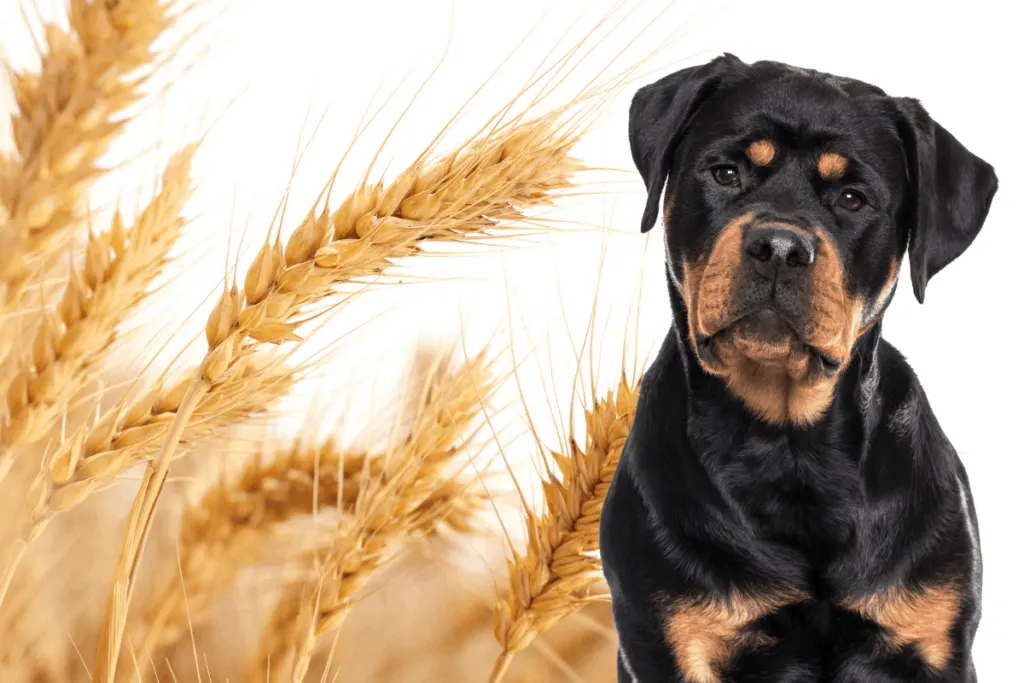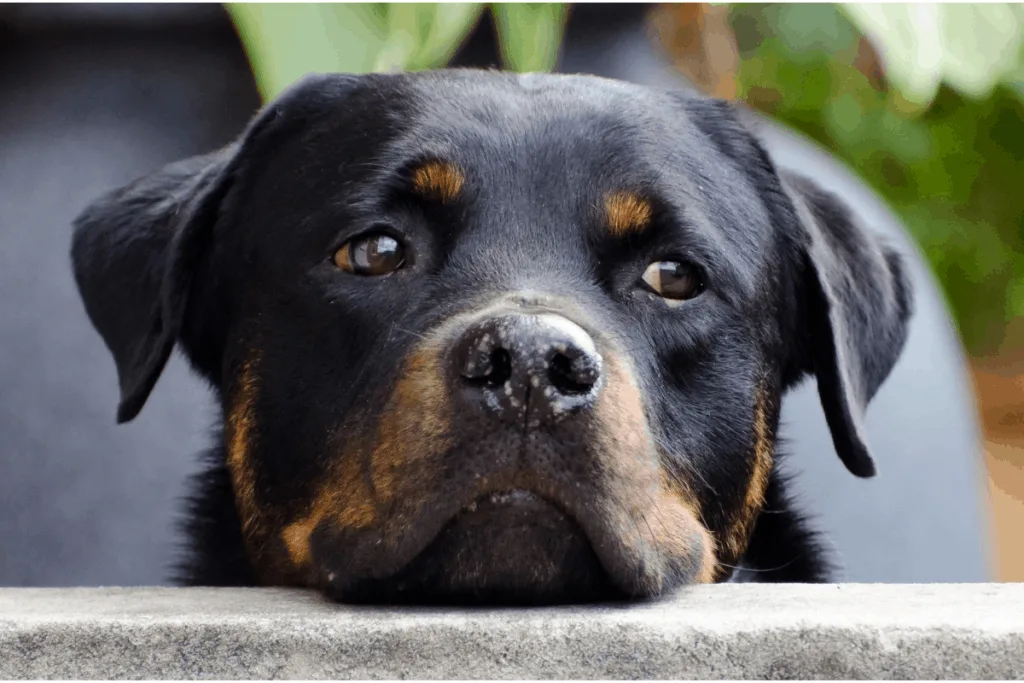
Providing the best nutrition for your Rottweiler can be a little more complicated than grabbing a large breed bag of kibble from the shelf at the pet food store.
Not all foods are high-quality, and then you are also faced with the trending diets. One of the most significant trending diets currently is the grain-free diet for dogs.
But how much science is actually behind grain-free dog foods?
Grain-free diets should not be the standard diet fed to a Rottweiler. Individual Rottweilers may benefit from a grain-free diet, e.g., if they are allergic to grain. A vet should always be consulted before putting a Rottweiler on grain-free food to make sure it will be beneficial and not harmful.
In this article, we examine the reasoning behind grain-free diets in dogs, how this relates to Rottweilers specifically, and whether or not science supports these reasons.
We also look at new research, which indicates that grain-free diets may actually be dangerous.
Click Here to Jump to a Section
What Are Grains?
When you talk about a grain-free diet, what foods are actually excluded?
There are the obvious ones like wheat, barley, oats, rice, and rye. And then there are the less obvious grains like corn and soy.
What Is The Reasoning Behind A Grain-Free Diet?
Grain-Free Diets Are Supposed To Limit Food-Related Allergies
These days, so many people seem to have an allergy to, or at least an intolerance of gluten.
The two major manifestations of such allergies or intolerances are digestive problems and dermatitis or related skin conditions.
Similarly, when dogs suffer from digestive or skin problems, one of the most commonly recommended solutions is to try them on a ‘hypoallergenic’ grain-free diet.
Grain-Free Diets Are Supposed To Minimize The Risk Of Bloating
Many people believe that grains are a trigger for bloating in dogs, so grain-free diets are supposed to minimize the risk of bloat.
In humans, bloat is uncomfortable; in dogs, it is a potentially fatal medical condition. The medical term for this condition is Gastric Dilatation Volvulus (GDV).
When a dog has GDV, their stomach bloats and twists. This torsion can cause the distended stomach to rupture, and it also cuts off the blood supply to the stomach and nearby organs.
If the dog is not treated immediately, it can suffer mass shock and internal blood loss, leading to death.
Grain-Free Diets Are Supposed To Control Obesity
Carbohydrates have become a taboo food in weight loss diets for humans.
Similarly, dog foods that are high in carbohydrate content are not recommended for dogs who struggle with obesity or related medical conditions like diabetes or pancreatitis.
Wheat, corn, soy, etc., are carbohydrates, so the exclusion of these grains is supposed to make dog food low in calories and appropriate for overweight dogs.
Are Rottweilers Prone To Food Allergies, Bloat, And Obesity?

Are Rottweilers Prone To Food-Related Allergies?
Some dog breeds are prone to developing food-related allergies. Are Rottweilers one of these breeds?
Our experience has shown us that Rottweilers are prone to skin, inhalant, and most certainly food allergies.
If you notice your Rottweiler has a chronically upset stomach or seems to scratch and lick a lot, you should take them to a veterinarian for a consultation.
Your veterinarian will confirm if the symptoms could be related to food allergies and can recommend a new diet.
Are Rottweilers Prone To GDV?
Rottweilers are one of the breeds prone to developing bloat, or GDV. They are not as susceptible as breeds like German Shepherds, but any increased risk should be taken seriously because of how dangerous this condition is.
In addition to the genetic predisposition of Rottweilers to GDV, VCA Hospitals report that dogs who weigh over 100 pounds have a 20% chance of bloating.
Rottweilers, especially males, very often tip the scales at over 100 pounds.
It is imperative to catch bloat early, and you should keep an eye on your Rottweiler for one or two hours after every meal.
The symptoms of GDV are as follows:
- Restlessness
- Pacing
- Abdominal tenderness and pain
- Visible distention of the abdomen
- Pale membranes (check gums and eyelids)
- Lip licking
- Excessive drooling
- Dry heaving
Are Rottweilers Prone To Obesity?
At the very least, you are not going to struggle to keep weight on your Rottweiler.
However, most people report these dogs to be at risk of becoming obese, and their weight needs to be carefully controlled through their diet and by providing adequate exercise.
Furthermore, Rottweilers are at increased risk of developing hypothyroidism, which also causes obesity.
For an entertaining yet serious look at Rottweiler obesity, just watch the video below. While this dog is certainly fun to watch, we caution all Rottweiler owners to take their Rottweiler’s weight seriously.
The skeletal and muscular systems of large breeds like Rottweilers are already under pressure to support their massive frames.
Additional weight can cause severe joint problems and reduce the lifespan of your Rottweiler.
What Does Science Say About The Reasoning Behind Grain-Free Food?
Do Grain-Free Diets Limit Food-Related Allergies In Rottweilers?
Unlike humans, the most common dog allergens are actually proteins. Dogs are more likely to have beef and chicken allergies than they are to be allergic to corn or rice, etc.
This is not to say that dogs cannot be allergic to grains; it’s just less likely than protein-related hypersensitivity.
Furthermore, it will probably be an allergy to a specific grain, like wheat, as opposed to grains in general.This means that you should not just switch to a grain-free diet without consulting a veterinarian.
Firstly, the digestive issues and scratching may not be related to allergies, and secondly, grains may not be the problematic food.
Do Grain-Free Diets Minimize The Risk Of Rottweiler’s Developing GDV?
GDV is scary. Your healthy dog can die within a matter of hours. Additionally, once a dog has bloated, the chances of it happening again are high. As such, owners want to do absolutely anything that they can to prevent this dangerous condition from developing.
But do grains actually increase the risk of bloating?
Well, for years, grain-free diets have been recommended to reduce the risk of GDV, yet the research supporting this is inclusive. In fact, there is some evidence suggesting that grains improve gastric emptying, which helps to prevent GDV.
Furthermore, there are many other and more conclusive ways to minimize the risk of bloat in Rottweilers.
If your Rottweiler has an intolerance or allergy to grains, then grain-free diets may be more beneficial in preventing GDV. Still, you should consult a veterinarian for professional guidance in reducing the potential for bloat.
Do Grain-Free Foods Help To Control Weight In Rottweilers?
Food manufacturers are very unlikely to replace the removed grains with animal-based proteins or fats. To make up the content, they will use potatoes, sweet potatoes, and legumes. These foods are still carbohydrates.
Grain-free foods can even have higher carbohydrate contents than non-grain-free foods. However, the carbohydrates in the grain-free options may be in healthier forms.
New Research Indicates That Grain-Free Diets Are Potentially Dangerous
Between 2014 and 2018, the FDA received increased reports of dogs suffering from a heart condition known as Dilated Cardiomyopathy (DCM).
DCM is usually a genetically controlled condition in which the heart muscles become weaker and weaker until they can no longer function properly to pump blood.
Veterinarians started diagnosing DCM in dogs without a genetic predisposition, and it caused enough of a stir for the FDA to open an investigation.
In attempting to find a common factor, the FDA looked at the diets of the affected dogs. They found that 90% of the dogs diagnosed with DCM were on grain-free diets, specifically the BEG (boutique, exotic, and grain-free) foods.
Final Thoughts
In conclusion, grain-free diets may reduce allergies, bloat, and obesity in Rottweilers, but this is not confirmed.
There is also evidence countering the arguments in favor of grain-free food. Grains are not common allergens in dogs, grains can improve gastric emptying, and grain-free foods are not necessarily low in carbohydrates.
If you are looking into a grain-free diet for your Rottweiler, you should always discuss the potential benefits and risks with a professional first, especially in light of the investigation into DCM and its possible grain-free diet-related cause.
